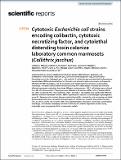Notice
This is not the latest version of this item. The latest version can be found at:https://dspace.mit.edu/handle/1721.1/133657.2
Cytotoxic Escherichia coli strains encoding colibactin, cytotoxic necrotizing factor, and cytolethal distending toxin colonize laboratory common marmosets (Callithrix jacchus)
| dc.contributor.author | McCoy, Colleen S | |
| dc.contributor.author | Mannion, Anthony J | |
| dc.contributor.author | Feng, Yan | |
| dc.contributor.author | Madden, Carolyn M | |
| dc.contributor.author | Artim, Stephen C | |
| dc.contributor.author | Au, Gina G | |
| dc.contributor.author | Dolan, Mikayla | |
| dc.contributor.author | Haupt, Jennifer L | |
| dc.contributor.author | Burns, Monika A | |
| dc.contributor.author | Sheh, Alexander | |
| dc.contributor.author | Fox, James G | |
| dc.date.accessioned | 2021-10-27T19:54:01Z | |
| dc.date.available | 2021-10-27T19:54:01Z | |
| dc.date.issued | 2021 | |
| dc.identifier.uri | https://hdl.handle.net/1721.1/133657 | |
| dc.description.abstract | © 2021, The Author(s). Cyclomodulins are virulence factors that modulate cellular differentiation, apoptosis, and proliferation. These include colibactin (pks), cytotoxic necrotizing factor (cnf), and cytolethal distending toxin (cdt). Pathogenic pks+, cnf+, and cdt+ E. coli strains are associated with inflammatory bowel disease (IBD) and colorectal cancer in humans and animals. Captive marmosets are frequently afflicted with IBD-like disease, and its association with cyclomodulins is unknown. Cyclomodulin-encoding E. coli rectal isolates were characterized using PCR-based assays in healthy and clinically affected marmosets originating from three different captive sources. 139 E. coli isolates were cultured from 122 of 143 marmosets. The pks gene was detected in 56 isolates (40%), cnf in 47 isolates (34%), and cdt in 1 isolate (0.7%). The prevalences of pks+ and cnf+ E. coli isolates were significantly different between the three marmoset colonies. 98% of cyclomodulin-positive E. coli belonged to phylogenetic group B2. Representative isolates demonstrated cyclomodulin cytotoxicity, and serotyping and whole genome sequencing were consistent with pathogenic E. coli strains. However, the presence of pks+, cnf+, or cdt+ E. coli did not correlate with clinical gastrointestinal disease in marmosets. Cyclomodulin-encoding E. coli colonize laboratory common marmosets in a manner dependent on the source, potentially impacting reproducibility in marmoset models. | |
| dc.language.iso | en | |
| dc.publisher | Springer Science and Business Media LLC | |
| dc.relation.isversionof | 10.1038/s41598-020-80000-1 | |
| dc.rights | Creative Commons Attribution 4.0 International license | |
| dc.rights.uri | https://creativecommons.org/licenses/by/4.0/ | |
| dc.source | Scientific Reports | |
| dc.title | Cytotoxic Escherichia coli strains encoding colibactin, cytotoxic necrotizing factor, and cytolethal distending toxin colonize laboratory common marmosets (Callithrix jacchus) | |
| dc.type | Article | |
| dc.relation.journal | Scientific Reports | |
| dc.eprint.version | Final published version | |
| dc.type.uri | http://purl.org/eprint/type/JournalArticle | |
| eprint.status | http://purl.org/eprint/status/PeerReviewed | |
| dc.date.updated | 2021-03-11T15:39:48Z | |
| dspace.orderedauthors | McCoy, CS; Mannion, AJ; Feng, Y; Madden, CM; Artim, SC; Au, GG; Dolan, M; Haupt, JL; Burns, MA; Sheh, A; Fox, JG | |
| dspace.date.submission | 2021-03-11T15:39:50Z | |
| mit.journal.volume | 11 | |
| mit.journal.issue | 1 | |
| mit.license | PUBLISHER_CC | |
| mit.metadata.status | Authority Work and Publication Information Needed |
